Professional Import-Export Cover Letter
Subject: Application for Import-Export Coordinator Position
Dear Hiring Manager,
I am writing to express my keen interest in the Import-Export Coordinator position at your esteemed organization. With over five years of experience managing international trade operations, I have developed strong expertise in customs documentation, shipment coordination, and supplier negotiations across multiple regions.
In my previous role at Global Freight Solutions, I successfully reduced shipment delays by 15% through process optimization and strong communication with freight forwarders. My knowledge of Incoterms, export compliance, and trade regulations allows me to handle cross-border logistics efficiently and accurately.
I would be delighted to bring my skills and experience to your team and contribute to your company’s global operations. Thank you for considering my application. I look forward to discussing how I can add value to your organization.
Sincerely,
[Your Name]
Import-Export Business Proposal Letter
Subject: Proposal for Partnership in Import-Export Operations
Dear [Recipient Name],
I hope this message finds you well. I am writing to propose a business collaboration between our companies in the field of import and export. Our firm specializes in sourcing high-quality products from Asia and exporting them to Europe and the Middle East. I believe that partnering with your organization can open new market opportunities for both parties.
We are currently seeking reliable partners to expand our trade network and streamline logistics processes. With our strong supplier base and experience in customs documentation, we can ensure smooth operations and timely deliveries.
Please let me know a convenient time to discuss this proposal in detail. I look forward to exploring how we can achieve mutual growth through a strategic partnership.
Best regards,
[Your Name]
Casual Import-Export Inquiry Email
Subject: Inquiry About Importing Your Products to Our Market
Hi [Recipient Name],
I came across your company’s products online, and I must say they look promising for our customers here in [Country]. I’d love to learn more about your export policies, minimum order quantities, and shipping options.
If possible, could you share your product catalog and current price list? We are exploring new suppliers and would like to see how we might collaborate soon.
Looking forward to your reply!
Warm regards,
[Your Name]
Formal Export Authorization Letter
Subject: Authorization for Export Operations
Dear Sir/Madam,
This letter serves as an official authorization for [Agent/Company Name] to act on behalf of [Your Company Name] in all matters related to export operations, including documentation, customs clearance, and shipment coordination.
We confirm that the authorized representative is permitted to sign relevant export forms, liaise with freight forwarders, and represent our company in dealings with customs authorities. This authorization remains valid until further notice or written revocation.
Please provide your full cooperation and assistance in ensuring the smooth handling of export transactions.
Sincerely,
[Your Name]
[Designation]
[Company Name]
Preliminary Import Negotiation Letter
Subject: Request for Preliminary Terms and Conditions
Dear [Supplier Name],
I am writing to express our interest in importing your [Product Name] to our market in [Country]. Before proceeding further, we would appreciate receiving preliminary details regarding pricing, minimum order quantities, payment terms, and estimated delivery times.
We aim to establish a long-term import partnership and would like to begin discussions at your earliest convenience. Please include information on product certifications and quality assurance processes in your response.
Thank you for your time and consideration. I look forward to your reply.
Kind regards,
[Your Name]
Heartfelt Export Appreciation Letter
Subject: Appreciation for Smooth Export Cooperation
Dear [Recipient Name],
I wanted to take a moment to sincerely thank you and your team for the excellent cooperation throughout our recent export transaction. The level of professionalism and attention to detail displayed by your staff has been truly commendable.
Thanks to your efficient coordination, our goods reached their destination on time and in perfect condition. We value this partnership deeply and look forward to continuing our successful collaboration in the future.
With appreciation and respect,
[Your Name]
Import Delay Apology Letter
Subject: Apology for Delay in Shipment Delivery
Dear [Client Name],
We sincerely apologize for the delay in delivering your recent import order. The delay was caused by unexpected customs inspections and shipping disruptions beyond our control. We understand the inconvenience this has caused and are working to expedite the process.
Please rest assured that we have taken corrective measures to prevent such delays in future transactions. We truly appreciate your patience and continued trust in our services.
Sincerely,
[Your Name]
Export Contract Confirmation Message
Subject: Confirmation of Export Contract Agreement
Dear [Recipient Name],
This is to confirm our agreement on the export contract signed on [Date] regarding the shipment of [Product/Quantity]. We have reviewed and accepted the terms related to pricing, delivery schedule, and payment conditions.
Our logistics department has already begun preparing the necessary documents to ensure timely dispatch. Please confirm receipt of this message and provide your shipping instructions for the upcoming batch.
Thank you for your cooperation and trust. We look forward to a fruitful business relationship.
Best regards,
[Your Name]
Quick Import Quotation Request Email
Subject: Request for Quotation for Imported Goods
Dear [Supplier Name],
Could you please send us your latest quotation for [Product/Material] including shipping and insurance to [Destination Port]? We are preparing a procurement plan and would appreciate receiving your prices as soon as possible.
Kindly include estimated delivery times and any applicable discounts for bulk orders. Thank you for your prompt response.
Regards,
[Your Name]
What is an Import and Export Cover Letter and Why Do You Need One
An import and export cover letter is a formal or semi-formal communication used in international trade contexts. It can accompany job applications, business proposals, shipment documents, or partnership offers. The main purpose is to present the sender’s intent clearly, whether it’s applying for a position, negotiating terms, or confirming trade agreements.
Who Should Write an Import and Export Cover Letter
These letters are typically written by professionals in logistics, trade compliance, freight forwarding, or international business management. Entrepreneurs managing import-export startups also use them to establish new business connections or authorize third-party agents to act on their behalf.
Whom Should the Letter Be Addressed To
Depending on the context, such letters may be addressed to hiring managers, suppliers, customs officials, logistics partners, or potential clients. When establishing a new business partnership, it is best addressed to decision-makers such as procurement directors or export managers.
When Should You Send an Import or Export Letter
Send these letters when applying for related job roles, initiating trade discussions, confirming contracts, authorizing agents, or addressing shipping issues. They can also be used after completing transactions to express appreciation or resolve operational challenges.
How to Write and Send an Import-Export Cover Letter
- Begin with a clear subject line and greeting.
- State your purpose early — e.g., proposal, inquiry, or confirmation.
- Include key trade details such as shipment type, product, and terms.
- Maintain a polite and professional tone throughout.
- Send via email for quick communication, or as a printed letter for formal authorizations.
Requirements and Prerequisites Before Writing
- Confirm correct contact information for sender and recipient.
- Have trade details, order references, or contract numbers on hand.
- Prepare any necessary attachments like invoices, pro forma statements, or authorization forms.
- Ensure compliance with relevant trade laws and documentation standards.
Formatting Guidelines and Best Practices
Keep the letter concise (one page is ideal). Use a formal tone for official matters and a friendly tone for inquiries or appreciation notes. Maintain clarity by separating paragraphs logically — introduction, body, and conclusion. Avoid jargon unless addressing technical trade professionals.
Follow-up Actions After Sending
After sending, monitor responses within a reasonable timeframe (typically 3–5 business days). For time-sensitive shipments, follow up via phone or message. Keep digital copies of correspondence for tracking and compliance records.
Common Mistakes to Avoid
- Forgetting to specify shipment or order details.
- Using informal language in professional communications.
- Failing to proofread for grammar or currency/quantity errors.
- Omitting attachments like invoices or certificates.
Pros and Cons of Sending an Import-Export Letter
Pros: Establishes professionalism, clarifies intent, improves coordination, and builds trust.
Cons: Poorly written letters can cause confusion or delay decisions if they lack clarity or completeness.
Tips and Tricks for Effective Import-Export Communication
- Always confirm receipt of your letter or email.
- Use bullet points for complex instructions.
- Keep your tone respectful and assertive.
- Double-check product codes, HS codes, and trade terms before sending.
Elements and Structure of an Import-Export Letter
- Subject line
- Greeting and introduction
- Purpose statement
- Main content (details, proposal, or issue)
- Closing and signature
- Attachments (if applicable)
Comparison with Other Business Letters
Unlike general business letters, import-export letters often include logistical, regulatory, and compliance details. They also tend to involve international correspondence, making clarity and cultural sensitivity more important.
Does It Require Attestation or Authorization
Some import-export letters—especially those granting authority to agents or confirming transactions—may require official stamps or notarization to be valid for customs or legal purposes. Always check destination country regulations before sending.
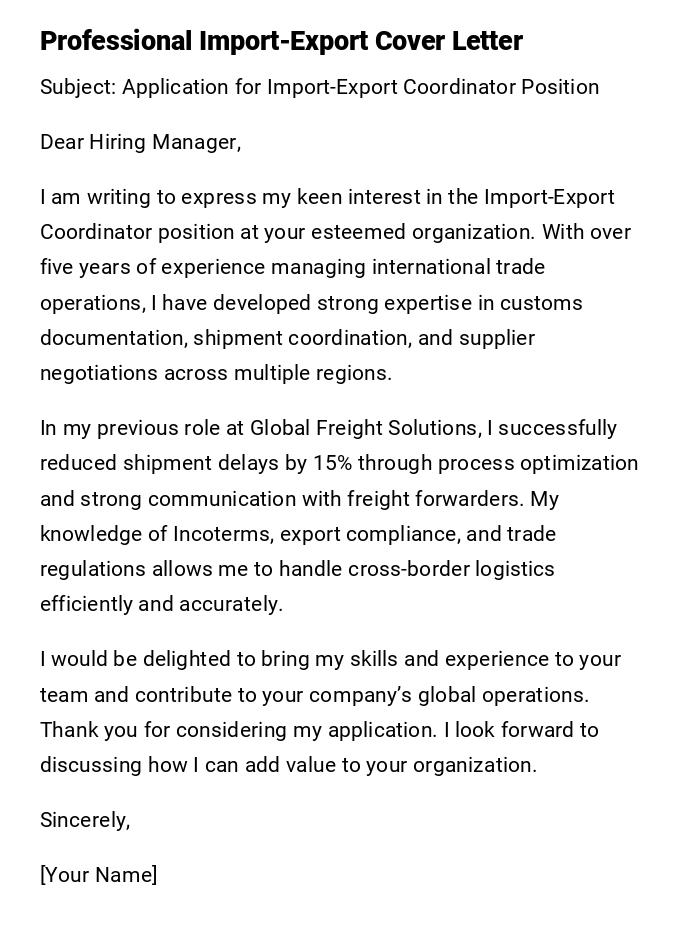
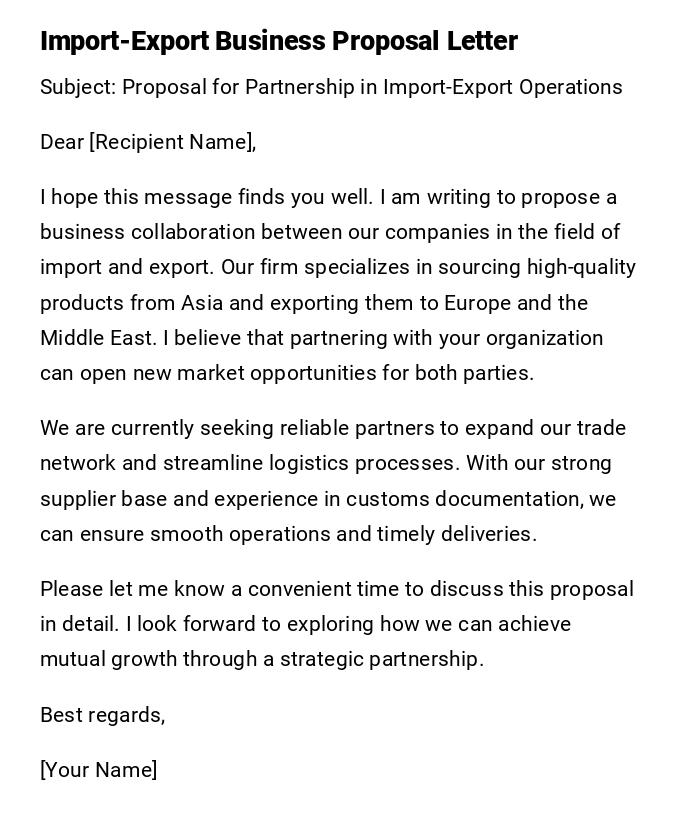
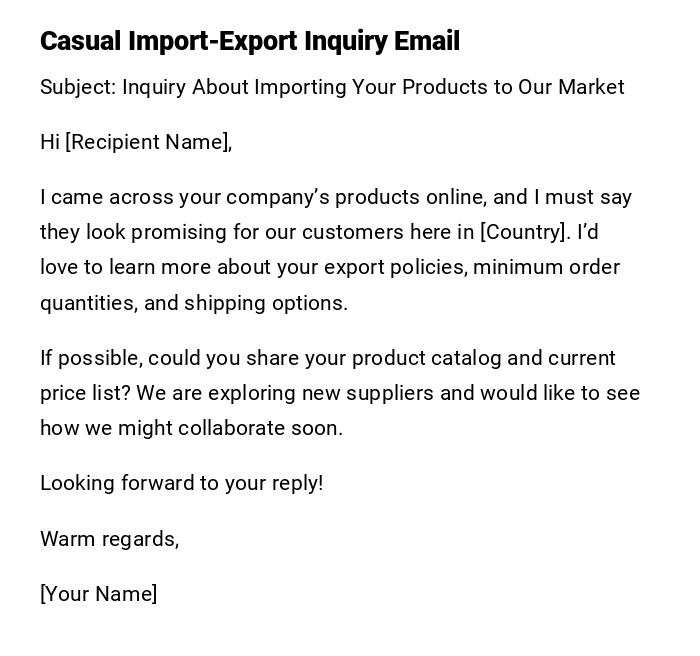
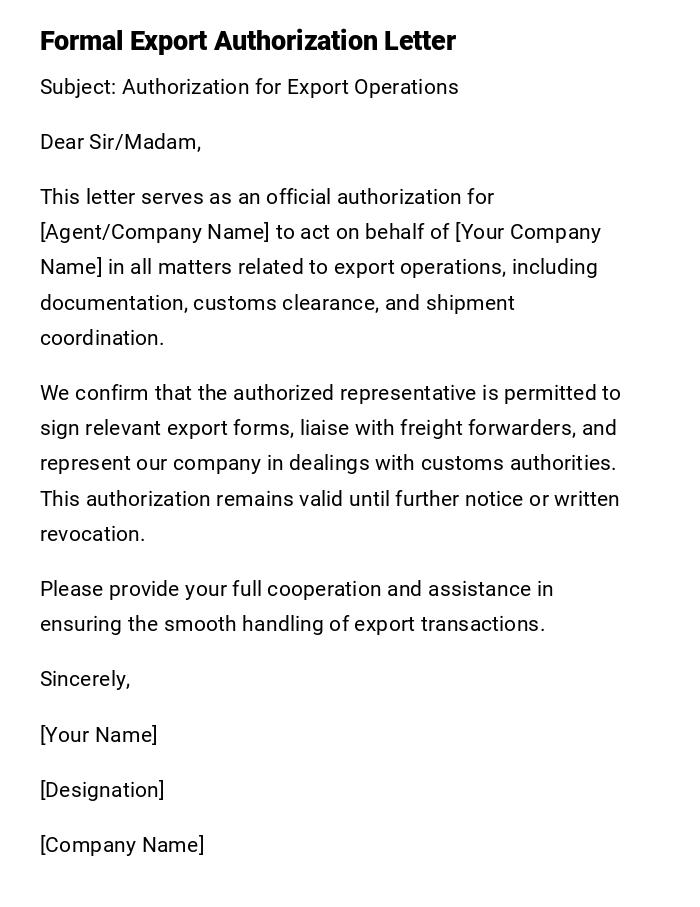
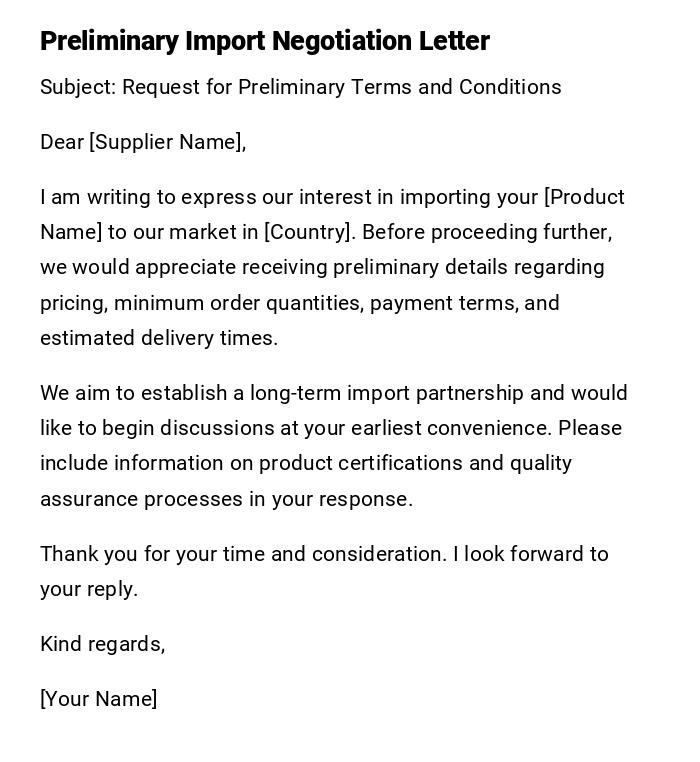
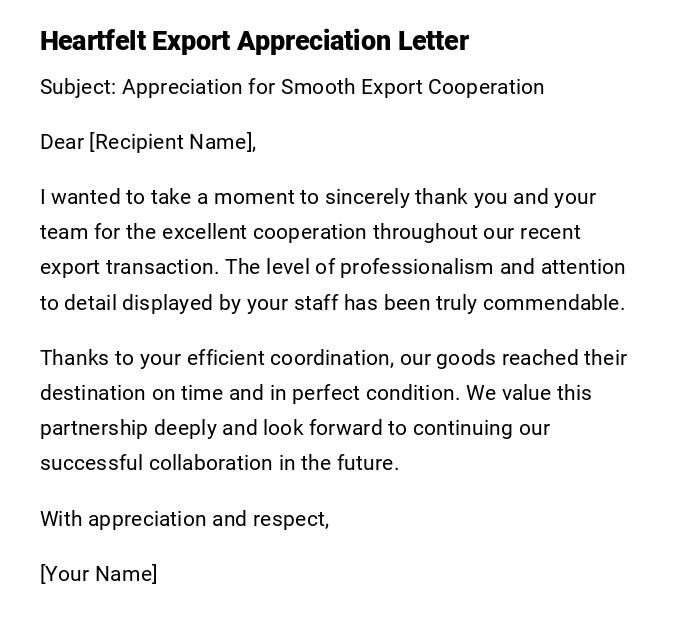
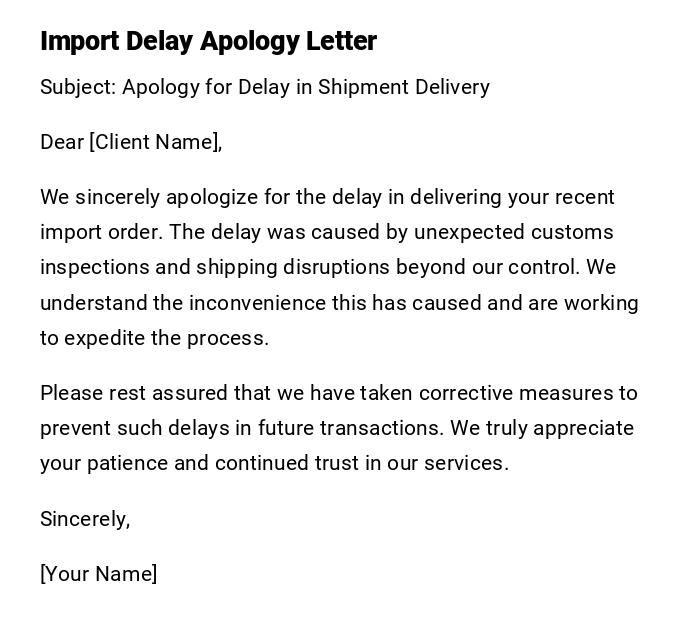
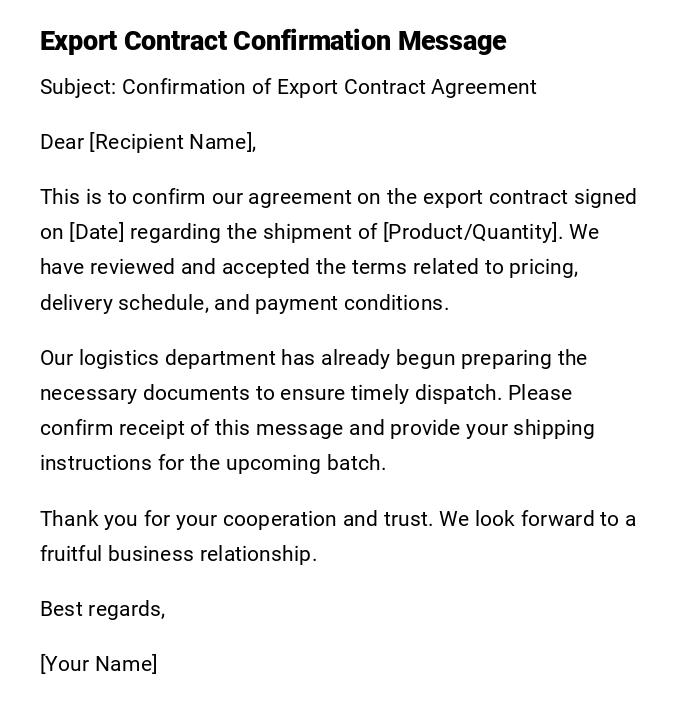
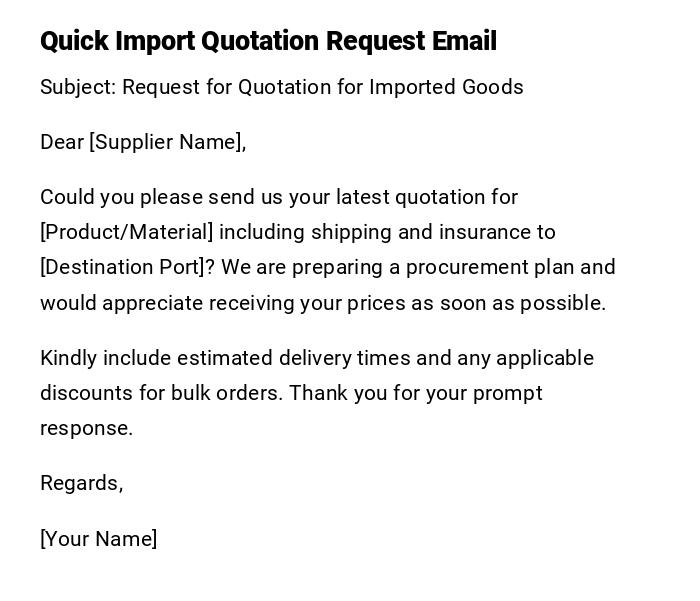

 Download Word Doc
Download Word Doc
 Download PDF
Download PDF